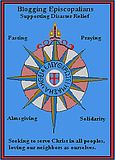Imagining the Messiah, part 1
I'm going to post portions of the meditations I gave yesterday. Some of it is in note form, so excuse any incomplete sentences.Hat tip to the Advent blog, Hopeful Imagination. I had planned this topic long before I discovered the blog, but what's going on over there helped me in my planning, and gave me the Brueggemann quote below.
I opened each meditation with a poem by someone in our Anglican tradition.
The Call (George Herbert)
Come, my Way, my Truth, my Life:
Such a Way, as gives us breath:
Such a Truth, as ends all strife:
And such a Life, as killeth death.
Come, my Light, my Feast, my Strength:
Such a Light, as shows a feast:
Such a Feast, as mends in length:
Such a strength, as makes his guest.
Come, my Joy, my Love, my Heart:
Such a Joy, as none can move:
Such a Love, as none can part:
Such a Heart, as joyes in love.
Why this topic? Why "Imagining the Messiah?"
Walter Brueggemann (Interpretation and Obedience)--"The key pathology of our time, which seduces us all, is the reduction of the imagination so that we are too numbed, satiated and co-opted to do serious imaginative work."
Imagination for me is one of the key elements of Advent. It is a season of reflection, kind of like Lent, but for me it has a different flavor (for me personally, this is why I prefer blue vestments for Advent, but I digress). In Lent, our work is self-examination, learning what one can shed from one's life to meet Jesus at the cross and at the empty tomb. Advent to me is symbolized by John the Baptist's call to repent--'repent' from the Greek 'metanoia', which literally means "change of mind."
To me, to ask for a change of mind, means letting go of those things which occupy our minds--as Brueggemann suggests--those things which numb, satiate and co-opt us, and ask God to take us into the imagination of hte divine. Because humans had plenty of ideas about what a Messiah should look like, but it was out of God's imagination that we have our Messiah--fully human, fully divine--born as a baby not in Rome but in Bethlehem.
So if we're going to repent this Advent, if we're going to change our minds, we want to ask God to help us conform them more and more to God's mind, to enter into the vision that God has for us. So we're going to think about imagination and what it can do for us in our Christian lives,a nd then we're going to think about what a Messiah is, and what changing our minds, opening our minds, imagining a Messiah might be like.
I found this definition on the web--
The poet Coleridge called imagination "the shaping and modifying power which enables a new reality to come into being."
But many people have commented that we as a society, and Christians, too, are frightened of imagination. For example, the hysterical response to Harry Potter, which underneath the talk of wizards and magic, contains the great themes of good versus evil, light versus darkness, love versus fear. Kathleen Norris in Amazing Grace traces Christian fear of the imagination to the Reformation's emphasis on Scripture alone, and a misunderstanding of what that meant. In my opinion, since we as a country are an end-product of that Reformation, it's not a surprise that we struggle with encouraging and using our God-given gifts of creativity and imagination.
A second force in our culture is the peculiar emphasis on products. A few days ago I saw a report on CNN covering some new Christian-themed videogames hitting the market. They interviewed one of the producers, who said, "there's a real spiritual hunger out there for spiritually-themed products." I did not throw my knitting at the television, although I was sorely tempted. It's not that I'm opposed to finishing tasks and completition of work--after all, I can hardly get up on Sunday and announce, you know, it's been a process kind of week and I don't have a finished homily for you." But the idea that our imagination has to be driven towards products for sale, and particularly products that feed into the satiation that Brueggemann identifies, is deadly to our creativity.
A quiet day is a good day to talk about imagination because it's a day when we step away from those things which distract us. Imagination is a response to being quiet. To being a little bored. To not having other things fill your mind.
But why do we need our iamgiantions? What's so wrong with not exercising it? Why is it theologically necessary?
I'll answer that question in the next post.

























2 Comments:
I have struggled with this concept for years! Very interesting post and I look forward to hearing how imagination and theology fit together. Thanks!
I liked the imagination approach and am familiar with the quote from Brueggemann. Loved the Colridge quote. Any more coming? thanks
Post a Comment
<< Home